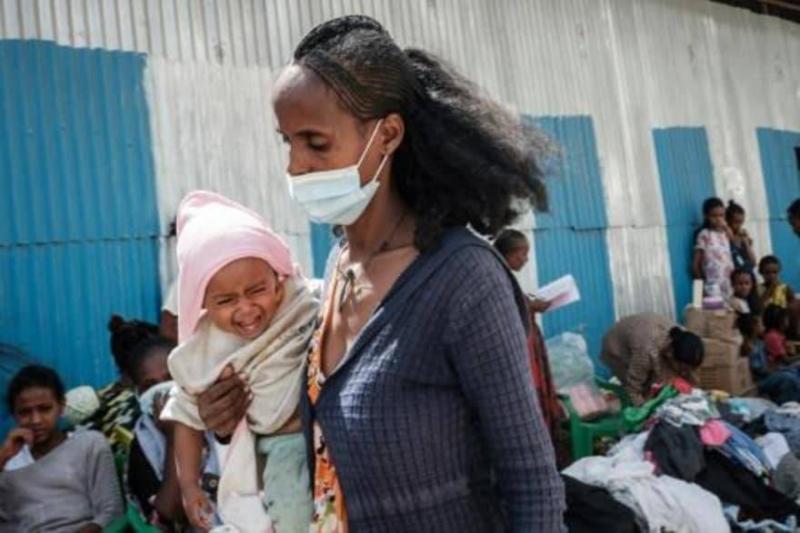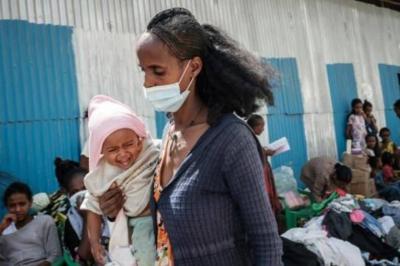A senior United Nations official has warned that more than 400,000 people have "entered famine" in the Tigray region of northern Ethiopia, which has been experiencing war for eight months, calling on the rebels to respect the ceasefire announced by Ethiopian authorities. The conflict in Tigray took a major turn on Monday with the announcement that forces from the Tigray People's Liberation Front regained control of Mekelle, the capital of the region.
NGOs and the World Food Programme stated that Ethiopian forces destroyed two vital bridges this week that are necessary for delivering aid to Tigray. During the first general meeting of the United Nations Security Council regarding Tigray since the onset of the conflict in November, UN Under-Secretary-General for Humanitarian Affairs Ramesh Rajasingham noted that the situation has "worsened significantly." He added, "We estimate that more than 400,000 people have entered famine and that another 1.8 million are on the brink of famine. Some say the numbers are even higher. About 33,000 children are suffering from severe malnutrition." He emphasized that "the lives of many people (in Tigray) depend on our ability to deliver food and medicines to them. We must reach them now, not next week. Now."
Ethiopia rejected accusations on Friday that it plans to block aid from entering Tigray after the rebels took control. Deputy Prime Minister Demeke Mekonnen told diplomats at a hotel in the capital Addis Ababa that "the suggestion that we are planning to choke the people of Tigray by preventing humanitarian aid and using hunger as a weapon in this war is unacceptable." He added that Ethiopian officials "are making every possible effort to lift" the people of Tigray "from their dire situation."
UN Under-Secretary-General for Political Affairs Rosemary DiCarlo urged the rebels, now referred to as the "Tigray Defense Forces," to "agree to an immediate and complete ceasefire" previously declared by the Ethiopian government in the region. The official stated at the beginning of the Security Council meeting that "a ceasefire adhered to by all parties would not only facilitate the delivery of humanitarian assistance but would also serve as a starting point for the necessary political efforts to chart a way out of the crisis."
Prime Minister Abiy Ahmed, who won the Nobel Peace Prize in 2019, deployed federal troops to Tigray in November to arrest and disarm the leaders of the then-ruling Tigray People's Liberation Front. He stated that this move was in response to attacks launched by the Tigray People's Liberation Front on federal army camps, and he announced victory within weeks after federal forces took control of the regional capital, Mekelle.
However, after months of regrouping, Tigray rebels—now calling themselves the Tigray Defense Forces—launched a wide counteroffensive last month that allowed them to regain Mekelle and assert control over the majority of the region. Subsequently, the government announced a unilateral ceasefire, which was dismissed by the Tigray Defense Forces as a "joke." The Tigray government, which ruled the region before the war, stated it would support UN organizations and relief agencies working to deliver aid to the people of Tigray to save lives.
The war has caused massive human casualties and a shocking humanitarian crisis, with the UN World Food Programme reporting that 5.2 million people, or 91% of the population of Tigray, are in need of urgent food assistance. On Friday, the programme announced it had resumed relief operations after a two-day halt and expressed hope of reaching 30,000 people "by the end of the week." However, it lamented the destruction of two major bridges leading to Tigray and stressed that people's lives are at risk due to that situation.
The programme added that "families are receiving some of the last stocks of food from the World Food Programme. Lives will be lost if supply routes to Tigray are not fully opened and if parties to the conflict continue to disrupt or endanger the freedom of movement of World Food Programme trucks and other aid agencies." Several countries including the United States, Ireland, and the United Kingdom, which backed the meeting opposed by African nations as being an internal Ethiopian matter, emphasized that humanitarian aid must be delivered without hindrance.
In his remarks to diplomats on Friday, Demeke reiterated the government's position by stating that the ceasefire was motivated by humanitarian concerns and aimed at facilitating farming. However, with power and communication outages, the suspension of flights, and the disruption of most roads, UN officials and diplomats fear that the situation could worsen.
EU Foreign Minister Josep Borrell tweeted, "A ceasefire does not mean cutting off electricity and destroying basic infrastructure. A true ceasefire means making every possible effort to get assistance to millions of children, women, and men who urgently need it." Demeke told diplomats that the government is preparing, following the national elections held on June 21, which are expected to give a new mandate to Abiy, for "an inclusive dialogue to resolve the Tigray crisis." He added that "this process will include legitimate opposition parties and members of the Tigray People's Liberation Front base who are willing to take the path of peace, as well as business circles, civil society organizations, and other prominent figures."
However, Ethiopian officials have indicated that negotiating with the leaders of the Tigray People's Liberation Front is unacceptable. Demeke and the spokesman for the government's crisis unit for Tigray, Redwan Hussein, stated that Addis Ababa wishes to impose sanctions on the leaders of the front due to their "responsibilities." Nevertheless, Demeke acknowledged that some front elements are "innocent" and should be included in the talks, according to diplomats.




